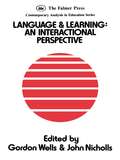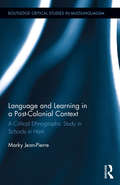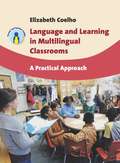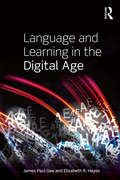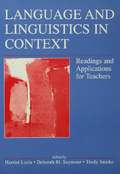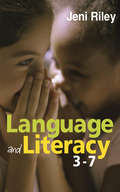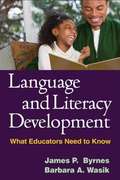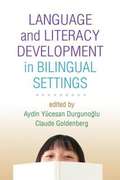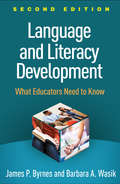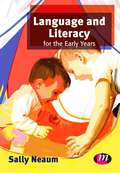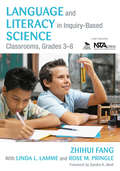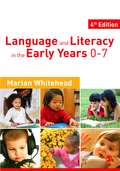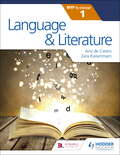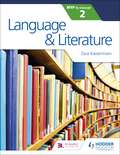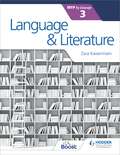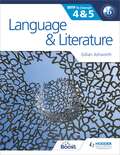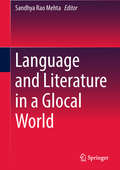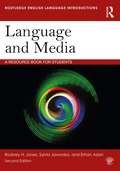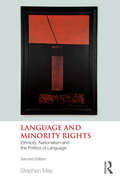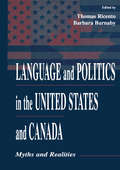- Table View
- List View
Language And Learning: An Interactional Perspective
by John NichollsFirst published in 1985. Routledge is an imprint of Taylor & Francis, an informa company.
Language and Learning in a Post-Colonial Context: A Critical Ethnographic Study in Schools in Haiti (Routledge Critical Studies in Multilingualism)
by Marky Jean-PierreThis book explores the social, political, and historical forces that mediate language ideology and practices in post-colonial education and how such ideology and practices influence students’ academic achievement. Jean-Pierre provides empirical evidence that a relationship exists between language practices and school underperformance. He takes Haiti as the focus of study, finding that students and teachers experience difficulty constructing knowledge in a setting in which the language they speak at home (Creole) differs from the language of instruction (French). The research is based on ethnographic data collected in classrooms in both private and public school settings in addition to different sectors of the society (e.g. state and private institutions).
Language and Learning in Multilingual Classrooms
by Elizabeth CoelhoThis book is a research-based practical guide for educators who work with students whose linguistic and cultural background is different from their own. Illustrated with many practical examples of classroom activities, projects, and teaching strategies, the book is also an introduction to immigrant education for school administrators and educational planners in communities or regions that are in the process of developing plans and programs for newcomer students. Although the focus is on first-generation immigrant children, many of the recommended approaches and instructional strategies described in this book can be used or adapted for use with second-generation children and historical linguistic and cultural minorities, such as children from Aboriginal communities in North America or children of Roma background in Europe.
Language and Learning in the Digital Age
by James Paul Gee Elisabeth R. HayesIn Language and Learning in the Digital Age, linguist James Paul Gee and educator Elisabeth Hayes deal with the forces unleashed by today’s digital media, forces that are transforming language and learning for good and ill. They argue that the role of oral language is almost always entirely misunderstood in debates about digital media. Like the earlier inventions of writing and print, digital media actually power up or enhance the powers of oral language. Gee and Hayes deal, as well, with current digital transformations of language and literacy in the context of a growing crisis in traditional schooling in developed countries. With the advent of new forms of digital media, children are increasingly drawn towards video games, social media, and alternative ways of learning. Gee and Hayes explore the way in which these alternative methods of learning can be a force for a paradigm change in schooling. This is an engaging, accessible read both for undergraduate and graduate students and for scholars in language, linguistics, education, media and communication studies.
Language and Linguistics in Context: Readings and Applications for Teachers
by Deborah M. Seymour Trudy Smoke Harriet LuriaTaking a sociocultural and educational approach, Language and Linguistics in Context: Readings and Applications for Teachers:*introduces basic linguistic concepts and current perspectives on language acquisition;*considers the role of linguistic change (especially in English) in the politics of language;*acknowledges the role of linguists in current policies involving language; *offers insights into the relationship between the structure of language systems and first- and second-language acquisition; the study of language across culture, class, race, gender, and ethnicity; and between language study and literacy and education; and*provides readers with a basis for understanding current educational debates about bilingual education, non-standard dialects, English only movements, literacy methodologies, and generally the importance to teaching of the study of language. The text is organized into three thematic units – "What is Language and How is It Acquired?"; "How Does Language Change?"; and "What is Literacy?". To achieve both breadth and depth – that is, to provide a “big picture” view of basic linguistics and at the same time make it specific enough for the beginner – a selection of readings, including personal language narratives, is provided to both introduce and clarify linguistic concepts. The readings, by well-known theoretical and applied linguists and researchers from various disciplines, are diverse in level and range of topics and vary in level of linguistic formalism. Pedagogical features: This text is designed for a range of courses in English and language arts, bilingualism, applied linguistics, and ESL courses in teacher education programs. Each unit contains a substantive introduction to the topic, followed by the readings. Each reading concludes with Questions to Think About including one Extending Your Understanding question, and a short list of Terms to Define. Each unit ends with additional Extending Your Understanding and Making Connections activities that engage readers in applying what they have read to teaching and suggested projects and a bibliography of Print and Web Resources. The readings and apparatus are arranged so that the material can be modified to fit many course plans and schemes of presentation. To help individual instructors make the most effective use of the text in specific classes, a set of matrixes is provided suggesting configurations of readings for different types of linguistics and education classes.
Language and Literacy 3-7: Creative Approaches to Teaching
by Dr Jeni RileyThis practical guide considers the research evidence that is needed to inform enlightened practice, and offers concrete suggestions and teaching approaches for early years settings and classrooms. This comprehensive book shows the 'what' the 'how' and the 'why' of innovative, creative practice for teaching language and literacy. The author clearly examines how young children learn to use both spoken and written language, and shows how to assess, plan and teach for the effective learning of speaking, listening, reading and writing. Each chapter includes case studies, learning and teaching suggestions and further reading, and topics covered include: o Learning to communicate o Developing spoken language in early years settings and classrooms o The links between oracy and literacy o The inter-relatedness of the literacy process o Teaching literacy holistically o The assessment of language and literacy o Supporting literacy in Keystage 1, teaching reading and teaching writing for different purposes o Children and books o Teaching children for whom English is an additional language o Language, literacy, learning and ICT.
Language and Literacy Development
by James A. Wasik James P. ByrnesChildren's speaking, reading, and writing skills are closely connected, and this engaging text guides preservice and practicing teachers in choosing instructional strategies that promote the integrated development of these skills. The authors explore the foundations of language in the developing brain and show how language acquisition in early childhood influences later literacy and language use. Chapters cover phonological skills, vocabulary, grammatical knowledge, comprehension, and writing, as well as instructional techniques and programs. The book examines why some students struggle with particular language and literacy tasks and how motivation and sociocultural factors affect proficiency. Rich classroom vignettes and examples of effective teaching strategies are accompanied by accessible explanations of relevant research.
Language and Literacy Development in Bilingual Settings
by Claude Goldenberg Aydin DurgunogluGrounded in state-of-the-art research, this book explores how English language learners develop both the oral language and literacy skills necessary for school success. Chapters examine the cognitive bases of English acquisition, and how the process is different for children from alphabetic (such as Spanish) and nonalphabetic (such as Chinese) language backgrounds. The book addresses a key challenge facing educators and clinicians identifying students whose poor English skills may indicate an underlying impairment, as opposed to still-developing language proficiency. Implications for diagnosis, intervention, and instruction are highlighted throughout.
Language and Literacy Development in Early Childhood
by Ewing, Robyn and Callow, Jon and Rushton, Kathleen Robyn Ewing Jon Callow Kathleen RushtonThis book provides pre-service and practising teachers with an integrated approach to language and literacy learning in early childhood. Written by leading academics in the field, it explores how children learn to talk, play using language, become literate and make meaning - from birth through to the pre-school years. Emphasising the importance of imagination and the arts in language learning, this book addresses a wide range of contemporary issues, highlights the impact of diverse socioeconomic, language and cultural backgrounds on young children's language and literacy development, and shows how early childhood teachers can effectively partner with parents and caregivers to help children learn through and about language. Case studies, interviews, reflective questions, clear links to the Early Years Learning Framework and the Australian Curriculum, and a rich array of practical and creative activities for use in early childhood environments help students connect theory and current research to practice.
Language and Literacy Development, Second Edition: What Educators Need to Know
by James P. Byrnes Barbara A. WasikThis established text--now revised and updated--reveals how spoken language skills are acquired and how they affect children’s later reading and writing achievement. With a unique focus on the needs of educators, the book examines the foundations of language in the developing brain. It explores the relationship of language processes to core literacy skills and probes the impact of motivational and sociocultural factors on children’s learning. Implications of developmental knowledge for classroom instruction are highlighted, and effective practices reviewed. Revealing vignettes, clear explanations of research, and lists of “main ideas” enhance the text’s accessibility for preservice teachers. New to This Edition *Chapter on emergent literacy and the predictors of reading success. *Incorporates the latest research, including findings from key longitudinal studies. *Increased attention to English learners, low-income children, and children with disabilities. *Updated and expanded topics, including usage-based theories of language acquisition, morphological knowledge in vocabulary and comprehension, phonological processing skills, and writing development.
Language and Literacy for the Early Years: 9780857257413 (Early Childhood Studies Series)
by Dr Sally Neaumhttp://www.uk.sagepub.com/repository/binaries/img/common/nurseryworld13.gif" width="175" height="152" border="0" align="right" /> Shortlisted for the 2013 Nursery World Awards! This is a focused text on early years' language and literacy for all students studying for degrees and foundation degrees in early childhood, early years and related disciplines and for candidates on EYPS pathways. It discusses language acquisition and development and covers development theory, talking with babies and the factors that affect development. Practical guidance on how to support children's language acquisition through rhymes, songs, story books and storytelling helps students see how theory links to practice. The text also examines the question 'what comes before phonics?' and includes interactive activities and theory focus features. About the Early Childhood Studies Series This series has been designed to support students of Early Years, Early Childhood Studies and related disciplines in popular modules of their course. Each text takes a focused look at a specific topic and approaches it in an accessible and user-friendly way. Features have been developed to help readers engage with the text and understand the subject from a number of different viewpoints. Activities pose questions to prompt thought and discussion and 'Theory Focus' boxes examine essential theory close-up for better understanding. This series is also applicable to EYPS candidates on all pathways. Other titles in the series include Early Childhood Studies, Childhood in Society for Early Childhood Studies, Child Development for Early Childhood Studies and Exploring Play for Early Childhood Studies.
Language and Literacy in Inquiry-Based Science Classrooms, Grades 3-8
by Zhihui Fang Linda L. Lamme Rose M. PringleThis hands-on resource offers a wealth of strategies aligned with national science education standards, including sample lessons for integrating reading instruction into inquiry-based science classrooms.
Language and Literacy in the Early Years 0-7
by Marian WhiteheadThis fourth edition of a text for childcare students reflects recent changes in the organization and regulation of early years care in the UK, including curriculum frameworks and related training initiatives. The book reviews competing theories of language acquisition and the development of children's verbal thinking, linking theory to practice with suggestions for providing an environment which builds on the strengths of young children. Part 1 describes contemporary approaches to the study of communication and language. An introduction to modern linguistics is followed by chapters on sociolinguistics, early language acquisition, and language and thinking. Part 2 covers literacy, with chapters on narrative and storytelling, the world of literature, and early representation and emerging writing. Boxes highlight exemplary programs, literary forms, specific titles, and examples from the classroom. Final chapters in each section relate the previous material to planning and provision for literacy development. Each individual chapter also includes specific teaching suggestions for the practitioner. The book is illustrated with b&w classroom photos and examples of children's early mark-making, and includes chapter key terms, concepts, and summaries. It also lists key texts, children's literature titles, DVDs, and websites. Whitehead is an independent consultant. Annotation ©2011 Book News, Inc. , Portland, OR (booknews. com)
Language and Literature for the IB MYP 1
by Ana De Castro Zara KaiserimamA concept-driven and assessment-focused approach to Language and Literature teaching and learning.- Approaches each chapter with statements of inquiry framed by key and related concepts, set in a global context- Supports every aspect of assessment using tasks designed by an experienced MYP educator- Differentiates and extends learning with research projects and interdisciplinary opportunities- Applies global contexts in meaningful ways to offer an MYP Language and Literature programme with an internationally-minded perspective
Language and Literature for the IB MYP 1
by Zara Kaiserimam Ana de CastroExam Board: IBLevel: MYPSubject: EnglishFirst Teaching: September 2016First Exam: June 2017Develop your skills to become an inquiring learner; ensure you navigate the MYP framework with confidence using a concept-driven and assessment-focused approach to Language and Literature presented in global contexts.- Develop conceptual understanding with key MYP concepts and related concepts at the heart of each chapter.- Learn by asking questions with a statement of inquiry in each chapter. - Prepare for every aspect of assessment using support and tasks designed by experienced educators.- Understand how to extend your learning through research projects and interdisciplinary opportunities.
Language and Literature for the IB MYP 2
by Zara KaiserimamA concept-driven and assessment-focused approach to Language and Literature teaching and learning.- Approaches each chapter with statements of inquiry framed by key and related concepts, set in a global context- Supports every aspect of assessment using tasks designed by an experienced MYP educator- Differentiates and extends learning with research projects and interdisciplinary opportunities- Applies global contexts in meaningful ways to offer an MYP Language and Literature programme with an internationally-minded perspective
Language and Literature for the IB MYP 2
by Zara KaiserimamA concept-driven and assessment-focused approach to Language and Literature teaching and learning.- Approaches each chapter with statements of inquiry framed by key and related concepts, set in a global context- Supports every aspect of assessment using tasks designed by an experienced MYP educator- Differentiates and extends learning with research projects and interdisciplinary opportunities- Applies global contexts in meaningful ways to offer an MYP Language and Literature programme with an internationally-minded perspective
Language and Literature for the IB MYP 3
by Gillian Ashworth Zara KaiserimamDevelop your skills to become an inquiring learner; ensure you navigate the MYP framework with confidence using a concept-driven and assessment-focused approach to Language and Literature presented in global contexts.- Develop conceptual understanding with key MYP concepts and related concepts at the heart of each chapter.- Learn by asking questions with a statement of inquiry in each chapter. - Prepare for every aspect of assessment using support and tasks designed by experienced educators.- Understand how to extend your learning through research projects and interdisciplinary opportunities.
Language and Literature for the IB MYP 3
by Zara Kaiserimam Gillian AshworthDevelop your skills to become an inquiring learner; ensure you navigate the MYP framework with confidence using a concept-driven and assessment-focused approach to Language and Literature presented in global contexts.- Develop conceptual understanding with key MYP concepts and related concepts at the heart of each chapter.- Learn by asking questions with a statement of inquiry in each chapter. - Prepare for every aspect of assessment using support and tasks designed by experienced educators.- Understand how to extend your learning through research projects and interdisciplinary opportunities.
Language and Literature for the IB MYP 4 & 5: By Concept (MYP By Concept)
by Gillian AshworthThe only series for MYP 4 and 5 developed in cooperation with the International Baccalaureate (IB)Develop your skills to become an inquiring learner; ensure you navigate the MYP framework with confidence using a concept-driven and assessment-focused approach to Language and Literature presented in global contexts.- Develop conceptual understanding with key MYP concepts and related concepts at the heart of each chapter.- Learn by asking questions with a statement of inquiry in each chapter. - Prepare for every aspect of assessment using support and tasks designed by experienced educators.- Understand how to extend your learning through research projects and interdisciplinary opportunities.This title is also available in two digital formats via Dynamic Learning. Find out more by clicking on the links at the top of the page.
Language and Literature for the IB MYP 4 & 5: By Concept (MYP By Concept)
by Gillian AshworthThe only series for MYP 4 and 5 developed in cooperation with the International Baccalaureate (IB)Develop your skills to become an inquiring learner; ensure you navigate the MYP framework with confidence using a concept-driven and assessment-focused approach to Language and Literature presented in global contexts.- Develop conceptual understanding with key MYP concepts and related concepts at the heart of each chapter.- Learn by asking questions with a statement of inquiry in each chapter. - Prepare for every aspect of assessment using support and tasks designed by experienced educators.- Understand how to extend your learning through research projects and interdisciplinary opportunities.
Language and Literature in a Glocal World
by Sandhya Rao MehtaThis collection of critical essays investigates the intersections of the global and local in literature and language. Exploring the connections that exist between global forms of knowledge and their local, regional applications, this volume explores multiple ways in which literature is influenced, and in turn, influences, movements and events across the world and how these are articulated in various genres of world literature, including the resultant challenges to translation. This book also explores the way in which languages, especially English, transform and continue to be reinvented in its use across the world. Using perspectives from sociolinguistics, discourse analysis and semiotics, this volume focuses on diasporic literature, travel literature, and literature in translation from different parts of the world to study the ways in which languages change and grow as they are sought to be ‘owned’ by the communities which use them in different contexts. Emphasizing on interdisciplinary studies and methodologies, this collection centralizes both research that theorizes the links between the local and the global and that which shows, through practical evidence, how the local and global interact in new and challenging ways.
Language and Media: A Resource Book for Students (Routledge English Language Introductions)
by Rodney H. Jones Sylvia Jaworska Erhan AslanRoutledge English Language Introductions cover core areas of language study and are one-stop resources for students. Assuming no prior knowledge, books in the series offer an accessible overview of the subject, with activities, study questions, sample analyses, commentaries, and key readings—all in the same volume. The innovative and flexible 'two-dimensional' structure is built around four sections—introduction, development, exploration, and extension— which offer self-contained stages for study. Each topic can also be read across these sections, enabling the reader to build gradually on the knowledge gained. This revised second edition of Language and Media: Provides an accessible introduction and comprehensive overview of the major approaches and methodological tools used in the study of language and media. Focuses on a broad range of media and media content from more traditional print and broadcast media formats to more recent digital media formats. Incorporates practical examples using real data, including newspaper articles, press releases, television shows, advertisements (print, broadcast, and digital), blogs, social media content, internet memes, culture jamming, and protest signs. Includes key readings from leading scholars in the field, such as Jan Blommaert, Sonia Livingstone, David Machin, Martin Montgomery, Ruth Page, Ron Scollon, and Theo van Leeuwen. Offers a wide range of activities, questions, and points for further discussion. The book emphasises the increasingly creative ways ordinary people are engaging in media production. It also addresses a number of urgent current concerns around media and media production/reception, including fake news, clickbait, virality, and surveillance. Written by three experienced teachers and authors, this accessible textbook is an essential resource for all students of English language and linguistics.
Language and Minority Rights: Ethnicity, Nationalism and the Politics of Language (Language In Social Life Ser.)
by Stephen MayThe second edition addresses new theoretical and empirical developments since its initial publication, including the burgeoning influence of globalization and the relentless rise of English as the current world language. May’s broad position, however, remains largely unchanged. He argues that the causes of many of the language-based conflicts in the world today still lie with the nation-state and its preoccupation with establishing a 'common' language and culture via mass education. The solution, he suggests, is to rethink nation-states in more culturally and linguistically plural ways while avoiding, at the same time, essentializing the language-identity link. This edition, like the first, adopts a wide interdisciplinary framework, drawing on sociolinguistics, applied linguistics, sociology, political theory, education and law. It also includes new discussions of cosmopolitanism, globalization, the role of English, and language and mobility, highlighting the ongoing difficulties faced by minority language speakers in the world today.
Language and Politics in the United States and Canada: Myths and Realities
by Thomas Ricento Barbara BurnabyThis volume critically analyzes and explains the goals, processes, and effects of language policies in the United States and Canada from historical and contemporary perspectives. The focus of this book is to explore parallel and divergent developments in language policy and language rights in the two countries, especially in the past four decades, as a basis for reflection on what can be learned from one country's experience by the other. Effects of language policies and practices on majority and minority individuals and groups are evaluated. Differences in national and regional language situations in the U.S. and Canada are traced to historical and sociological, demographic, and legal factors which have sometimes been inappropriately generalized or ignored by ideologues. The point is to show that certain general principles of economics and sociology apply to the situations in both countries, but that differing notions of sovereignty, state and nation, ethnicity, pluralism, and multiculturalism have shaped attitudes and policies in significant ways. Understanding the bases for these varying attitudes and policies provides a clearer understanding of the idiosyncratic as well as more universal factors that contribute to tensions between groups and to outcomes, many of which are unintended. The volume makes clear that language matters always involve issues of culture, economics, politics, individual and group identities, and local and national histories. The chapters provide detailed analyses on a wide range of issues at the national, state/provincial, and local levels in both countries. The chapter authors come from a variety of academic disciplines (education, geography, journalism, law, linguistics, political science, and sociology), and the findings, taken together, contribute to an evolving, interdisciplinary theory of language policy.
